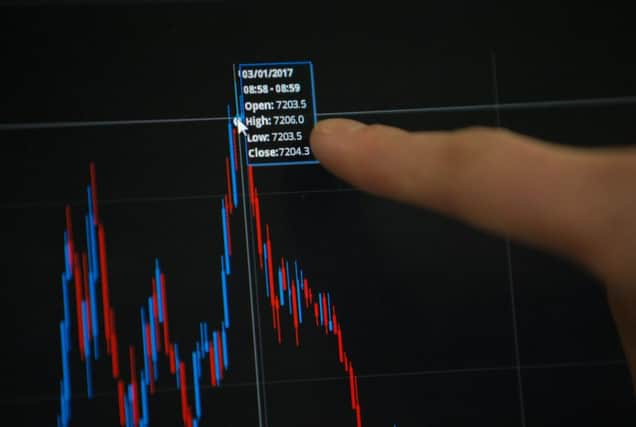Bill Jamieson: Onwards and upwards to 8,000 (while it lasts)


Having notched up six all-time highs in the past three weeks, the FTSE 100 is now just 3.6 per cent short of the 8,000 mark, a milestone experts believe it can reach. “At the moment,” says Richard Stone, chief executive of The Share Centre, “the forces of demand are winning the day and driving equity prices higher. I believe this is likely to continue and could drive the FTSE 100 index above 8,000 for the first time in the index’s history.”
However, cautious investors, fearing for months that a correction is at hand, have opted out of this rally. Instead, they have stepped up their holdings of government and corporate bonds.
Advertisement
Hide AdAdvertisement
Hide AdLatest figures on fund sales from the Investment Association revealed that bond funds were yet again the bestsellers, as they have been for the last six months, enjoying around three times the inflows of equity funds in November.
Investors have been keen to lock in some of the gains from stellar stock market performance over the last 18 months by opting for the perceived safety of fixed income.
But that sense of security as recompense for missing out on the latest spurt in share prices may prove misplaced
The sunshine of record equity prices last week was accompanied by ominous rumblings of thunder. There were nervous tremors in global bond markets amid worries that the multi-year run in bonds may be coming to an abrupt end.
Falling bond prices and their alter ego – rising bond yields – would signal an end, or at best an interruption, of the nine-year era of cheap money costs that have helped fuel stock markets world-wide.
The yield on that global bellwether – US ten-year treasuries – hit 2.57 per cent, its highest level in ten months. This prompted the veteran (though not always reliable) fixed-income guru Bill Gross to declare a “bond bear market”.
Meanwhile analysts at Rabobank said that while the ten-year treasury yield had reached higher levels in March last year, the latest sell-off appeared significant. Their verdict? “‘We might just have broken the long-run bull-market trade of the past few decades.”
So: worries about a bond market slide and continuing apprehension about geo-political stability: how, in the face of these, might the UK equity market be able to continue its advance to 8,000?
Advertisement
Hide AdAdvertisement
Hide AdImpressive though the continuing strength in share prices looks, the UK market has been under-performing global stock markets – and has been doing so for the past two years. Share enthusiasts could thus argue the UK is relatively cheap compared to other markets.
At the same time the yield offered by the FTSE100 at 3.78 per cent is an additional attractive prop to share prices.
The stronger the recovery in the oil price – the price of Brent crude futures has leapt from $45 a barrel last summer to $69.88 at the end of last week – the safer the dividend yield from oil giants BP and Shell becomes.
The ‘January effect’
Finally, what of the historical record of market behaviour at the start of the year? Is there a January effect, as CityWire’s Michelle McGagh speculated last week?
Records show that a positive performance in January points to further gains over the rest of the year. This has happened 79 per cent of the time since 1984.
Analysis from Fidelity International shows that over those 34 years the FTSE 100 has risen in the first month of the year in 19 of those years and in all but four occasions has gone on to record further gains between February and December.
Says Tom Stevenson, investment director for personal investing at Fidelity, “This is an old stock market adage that states ‘as goes January, so goes the year’. As far as short term buy signals go then, the ‘January effect’ seems to have a reasonably reliable hit rate.”
However, other analysts warn that this trend has tended to weaken since 2000 and in any event the FTSE100’s gain in January despite all the hype is an underwhelming 0.4 per cent.
Advertisement
Hide AdAdvertisement
Hide AdNevertheless, a final charge on the FTSE100 at 8,000 looks as likely as not. But given what happened after the long wait for the market to breach 6,000 – greeted with euphoric enthusiasm only for markets to tumble back to 4,300 – private investors may be excused a preference to “pass up” on this occasion.